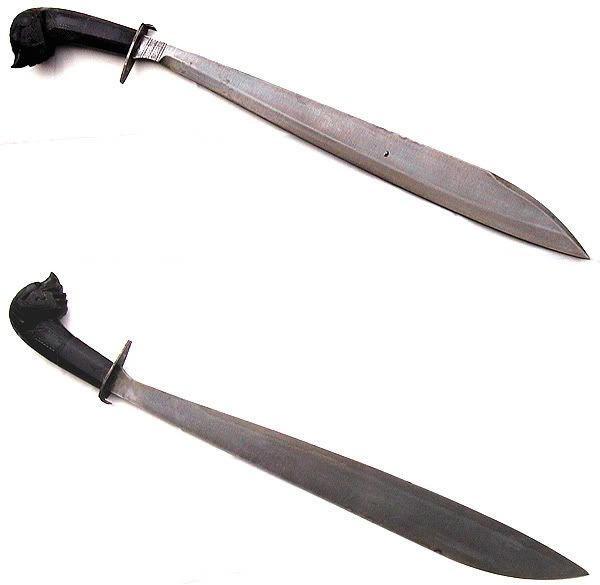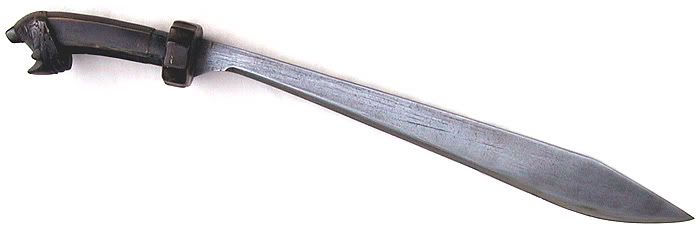
 |
|
|
|
|
#1 |
|
Member
Join Date: Sep 2006
Location: new mexico
Posts: 4
|
Hi!
I'm new here and still learning my way around this intense forum ... so much information! Can anyone help me understand the difference between tenegre and binangon swords from the Philippines. I've seen some images of both on various threads here, and they look quite similar to me. Also, do they serve different fuctions? Also, does anyone know of a good, reliable, factual reference source? Much much thanks!!! |
|
|

|
|
|
#2 |
|
EAAF Staff
Join Date: Dec 2004
Location: Louisville, KY
Posts: 7,363
|
Zelbone and Ian are better in this area than I.

|
|
|

|
|
|
#3 |
|
Member
Join Date: Dec 2004
Location: Virginia
Posts: 520
|
Like Batarra I am sure there are many here who can better explin this than I can but my understanding is that it is the blade shape, particularly the type of tip that decides which is which with the tenegre having the more pointed blade.
|
|
|

|
|
|
#4 |
|
Vikingsword Staff
Join Date: Dec 2004
Location: The Aussie Bush
Posts: 4,609
|
Hi blades:
Battara's being unduly kind. You really need Zel (zelbone) or Shelley (LabanTayo) to help you with Visayan swords. I believe there may be a book in the works involving the two of them and a few others. Otherwise there is very little published about Visayan swords, although searching the pages here and on the old Forum (see the Home Page - UBB Forum) for these swords will turn up a lot of useful information and pictures. Here are two deity-hilted swords from the western Visayas. The first one is a Binangon or Ginunting which has a relatively straight cutting edge while the back curves down towards the point.  The second is a Tenegre which is usually a fat-bellied bolo that has a curved cutting edge and a "clipped point" where the back edge is straight and its furthest end is angled down towards the point.  Regards, Ian. Last edited by Ian; 7th September 2006 at 11:15 PM. |
|
|

|
|
|
#5 |
|
Member
Join Date: Sep 2006
Location: new mexico
Posts: 4
|
Thanks Ian!
This is really helpful -- it's great to see clear images with a label!!! As you mention - that there are few publications on this stuff -- you can imagine how I have been struggling with this. In addition to the difference in the blade, it looks like the diety (?) on the hilt is different -- it that right? also are Binangon and Ginunting the same thing -- just different words ... or are they different types of swords, or from different cultures, or different language, etc.?? Again much thanks. I'll look forward to hearing from you again ... as well as zelbone and LabanTayo! All best! |
|
|

|
|
|
#6 |
|
Member
Join Date: Dec 2004
Location: Virginia
Posts: 520
|
I think the type of deity on the hilt tell more where it came from not which of these types it is but I could be wrong. Here are some other diety heads
  
Last edited by RhysMichael; 8th September 2006 at 01:58 AM. |
|
|

|
|
|
#7 | |
|
Vikingsword Staff
Join Date: Dec 2004
Location: The Aussie Bush
Posts: 4,609
|
Quote:
These issues have been much discussed on this forum, and the consensus is that there are many tribal/regional differences in describing a particular sword pattern. For example, binangon and ginunting basically describe the same blade pattern. You would need to check with Zel or Shelley, however, about which term is used where. They visited the Visayas a year or so back and did some serious on the ground research. Many of us are looking forward to reading their findings. Some of our more experienced members favor using a simple term to describe swords of various patterns, with sundang being the favored generic term. If you search this forum for "sundang" you will find some of those discussions. Sorry I can't be more helpful. Perhaps some of our Filipino collectors can add more. Regards, Ian. |
|
|
|

|
 |
|
|